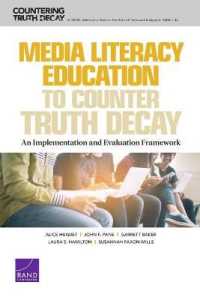- ホーム
- > 洋書
- > 英文書
- > History / World
Full Description
As the first book-length examination of abolition and its legacies in Mexico, this collection reveals innovative social, cultural, political, and intellectual approaches to Afro-Mexican history. It complicates the long-standing belief that Afro-Mexicans were erased from the nation. The volume instead shows how they created their own archival legibility by continuing and modifying colonial-era forms of resistance, among other survival strategies. The chapters document the lives and choices of Afro-descended peoples, both enslaved and free, over the course of two centuries, culminating during the Mexican Revolution of 1910. Contributors examine how Afro-Mexicans who lived under Spanish rule took advantage of colonial structures to self-advocate and form communities. Beginning with the war for independence and continuing after the abolition of slavery and caste in the 1820s, Afro-descended citizens responded to and, at times, resisted the claims of racial disappearance to shape both local and national politics.
Contents
Chronology of key events in Afro-Mexican history; Introduction Nicole von Germeten and Theodore W. Cohen; Part I. Freedom and Colonial Legacies: 1. The limit of Afro-Mexico: archival abundance in a fragmented diaspora Joseph M. H. Clark; 2. 'Having never been set down in the register': Afrodescendant responses to tributary status in the late-eighteenth century Norah L. A. Gharala; 3. Power and belonging: the rise, fall, and erasure of José Antonio Martínez in Veracruz's early war for independence Alan Alexander Malfavon; 4. Mexico and the contested road to abolition: the case of Coahuila y Tejas 1821-1837 Beau D. J. Gaitors; Part II. (Un)Disappearing Black Mexico: 5. Historical memory about slavery, abolition, and Afro-descendants in the Mexican press, 1821-1860 Jorge E. Delgadillo Nunez; 6. The geography of race in Oaxaca's Costa Chica: Commodities, culture, and citizenship during Mexico's liberal economic transformation John Milstead; 7. Oilseed archives: Reading Afro-Mexico landscapes in plants and plantations Jayson Maurice Porter; 8. The pictorial limits of the nation: race, mestizaje, and the postrevolutionary national color line Deborah Cohen; 9. Reflections from the twentieth century: the nineteenth century's absence in the origins of Afro-Mexican studies Theodore W. Cohen; Index.







